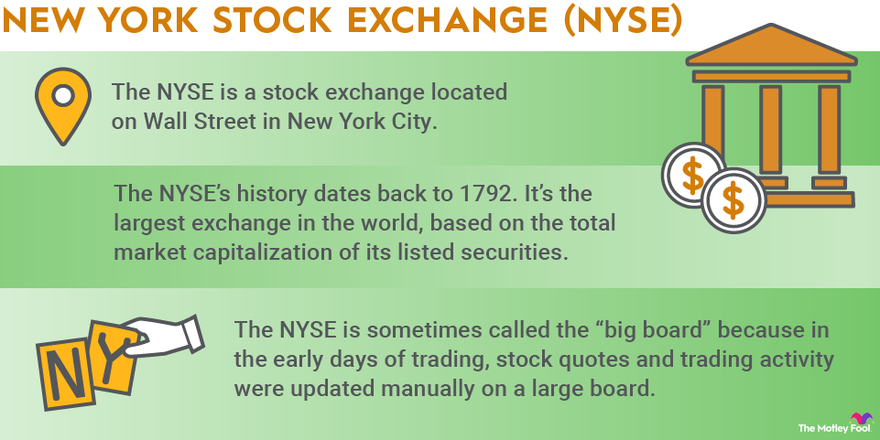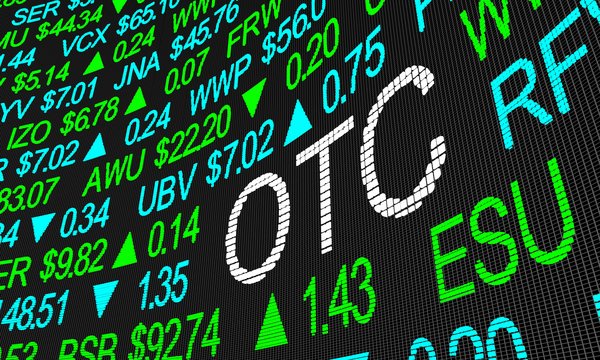The New York Stock Exchange (NYSE) is the biggest marketplace in the world for investors to buy and sell shares of stock. Located on Wall Street in New York City and owned by Intercontinental Exchange (ICE -2.25%), the NYSE has a history that goes back more than 200 years. Most of the largest, best-known, and most prestigious businesses in the world choose to list their shares on the stock exchange.

How the New York Stock Exchange (NYSE) works
The New York Stock Exchange has two primary functions:
- It provides a central marketplace for investors to buy and sell stock.
- It enables companies to list their shares and raise capital from interested investors.
The NYSE provides a location where its members can trade stock in listed companies. Historically, traders called out their buy or sell orders to each other on the exchange trading floor. When a buyer and a seller agreed on a price, a trade would occur. Transactions would then be reported on the exchange, providing transparency and enabling efficient market operations.
Now, with electronic trading, NYSE-run computers are largely responsible for matching up buyers and sellers in real time. However, the system still operates in a similar fashion, with investors placing orders stating at what price they'd be willing to buy or sell.
Most investors aren't members of the NYSE, but many of the brokerage companies that allow them to invest in stocks are. When a brokerage customer places a trade for a NYSE-listed stock, the brokerage company relays the order to its NYSE trading operations, which then handle executing the trade and following the customer's instructions.
The NYSE also acts as a gateway for companies that want to raise money by selling stock. Companies that want to list their stock on the NYSE have to meet both the U.S. Securities and Exchange Commission’s disclosure requirements for publicly traded companies and the specific listing requirements the NYSE imposes. Young companies often seek to have their initial public offerings on the NYSE in order to gain the prestige of having their shares traded alongside those of many of the top companies in the world.
What are NYSE trading hours?
The New York Stock Exchange is generally open on weekdays and is closed on Saturday and Sunday. Trading begins each day at 9:30 a.m. ET and ends at 4 p.m. ET.
As you can see in the table below, the NYSE observes certain U.S. federal holidays each year. In addition to being closed all day on these days, the NYSE has half-day sessions on two days each year: the Friday after Thanksgiving and Christmas Eve (if it falls on a weekday and if the regular Christmas holiday is observed on Dec. 25). During those half-day sessions, the market opens at 9:30 a.m. ET but closes early at 1 p.m. ET.
Other Major Exchanges
NYSE Market Holidays
| Holiday | 2021 Date |
|---|---|
| New Year's Day | Fri., Jan. 1 |
| Martin Luther King Day | Mon., Jan. 18 |
| Washington's Birthday | Mon., Feb. 15 |
| Good Friday | Fri., Apr. 2 |
| Memorial Day | Mon., May 31 |
| Independence Day | Mon., July 5 (observed) |
| Labor Day | Mon., Sep. 6 |
| Thanksgiving Day | Thurs., Nov. 25 |
| Christmas Day | Sat., Dec. 25 |
Source: New York Stock Exchange
History of the New York Stock Exchange (NYSE)
The New York Stock Exchange's history dates back to 1792, when two dozen stockbrokers met on Wall Street and agreed to create an exchange to buy and sell various types of investments, including stocks and bonds. Known as the Buttonwood Agreement, this pact eventually led to the brokers centralizing in their current location on Wall and Broad streets in the mid-1860s.
Over time, the NYSE has gradually modernized its operations by adopting new technology to facilitate trading activity. Although the stock exchange still has a trading floor, there's now extensive electronic trading activity on the NYSE, complementing the live trading activity that still takes place.
There's also been considerable consolidation among exchanges through the years, making the NYSE part of a much broader network of exchanges. NYSE owner Intercontinental Exchange operates futures and options exchanges, and the NYSE also has a separate market for bond trading.
NYSE's sister stock exchanges include NYSE American (formerly the American Stock Exchange), NYSE Arca for exchange-traded funds, NYSE Chicago (formerly the Chicago Stock Exchange), and the all-electronic NYSE National exchange (formerly the Cincinnati Stock Exchange). These other exchanges complement the NYSE by having different listing standards, different methods of trading, or a focus on products other than stocks.
The NYSE has a reputation for being the most prestigious and important stock exchange in the world. Investors in U.S. stocks rely on the services the NYSE has provided for more than 200 years and will continue to do long into the future.
NYSE Exchange FAQs
What is the NYSE?
The New York Stock Exchange is the biggest marketplace in the world for investors to buy and sell shares of stock.
What are the NYSE trading hours?
The New York Stock Exchange is generally open Monday through Friday and is closed on Saturday and Sunday. Trading hours are from 9:30 a.m. ET until 4 p.m. ET.
What is the Nasdaq exchange?
The Nasdaq Stock Market, or simply Nasdaq, is the second-largest stock exchange in the world for investors looking to buy and sell shares of stock. Nasdaq was initially the acronym NASDAQ, which stands for the National Association of Securities Dealers Automated Quotations.











